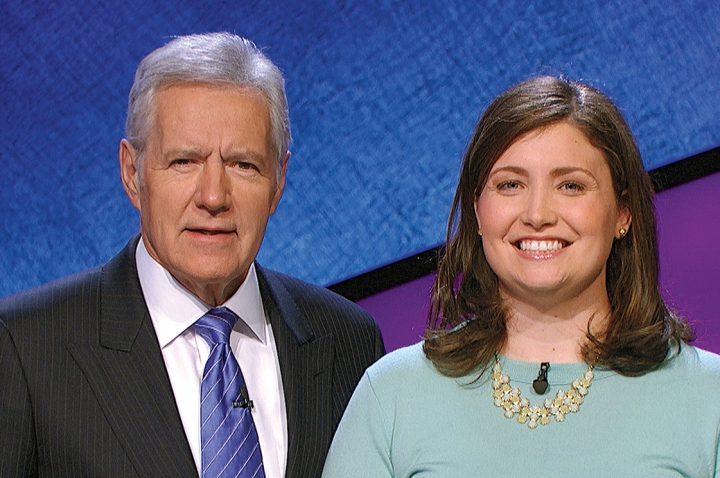The answer: This woman won more consecutive games than all but one person in Jeopardy! history. If you buzzed in with “Who is Julia Collins ’05,” you’d be right.
Earlier this year, Collins won 20 games of Jeopardy!, second behind only the legendary Ken Jennings, who won 74. She also racked up $428,100 and became the winningest woman ever on the show. But, aside from her game-show prowess, who is Julia Collins? “I didn’t become a different person having been on the show,” she says. “This doesn’t make me more interesting than I was before, so the idea that people are more interested in me—it’s been strange.”
Based in Kenilworth, Ill., Collins has worked in management consulting since earning a bachelor’s degree in art history and history from Wellesley and a master’s degree in supply-chain management and logistics from MIT. She’s also currently between jobs, so the attention from her Jeopardy! streak has some benefits. “I’ve been contacted by a lot of recruiters,” Collins says. “It’s created opportunities for me.” In addition to weighing her options for future employment, Collins took a month-long vacation in France between winning all those games (tapings were held in January and February) and when those games actually aired (April, May, and June).
Aside from likely splurging on more travel, her main plans for her winnings involve saving and investing it. “Taxes are going to take a hefty bite,” she laughs, “but it’s still a lot of money—and it’s money I didn’t have before, so I’m happy.” One big item on her schedule was this fall’s Tournament of Champions. “I want to win,” Collins says. “I think it will be a very different dynamic playing against people who have all won games.”
With 21 games under her belt, she approached the tournament in much the same way she did her initial game. “I studied a lot, actually,” Collins says. “I read about opera and Shakespeare and the space program. Then I started watching the show more regularly, and if things would come up that I didn’t feel like I was as strong in, I would put those on my list.”
A longtime fan of the show, Collins had wanted to be a contestant since she was a kid. When she learned that initial tryouts are online, she decided to go for it. “The first part of the audition process is this online test that the show has every January,” she says. Although this year’s success makes Collins seem like a lock, she actually first tried out in 2009 and didn’t make it on. “So I tried again,” she says. “I had a better idea of what the expectations were.” The show called her in December 2013, asking her to appear in January.
After that—well, that’s Jeopardy! history. “I just thought, ‘I’m going to go up there and try to buzz in first and give the right answers.’ I knew about these other strategies,” Collins says, “but I didn’t really find that was necessary.” She was right. In addition to taking second place for games won, she moved into third place for total nontournament winnings. She lost in Final Jeopardy during her 21st game, on a clue involving author John Irving. “Nobody likes to lose, and I had such a good time playing that I didn’t really want to stop,” Collins says. “But how can I say that this wasn’t an unqualified positive experience? That it wasn’t a great success? Because it was.”








We ask that those who engage in Wellesley magazine's online community act with honesty, integrity, and respect. (Remember the honor code, alums?) We reserve the right to remove comments by impersonators or comments that are not civil and relevant to the subject at hand. By posting here, you are permitting Wellesley magazine to edit and republish your comment in all media. Please remember that all posts are public.